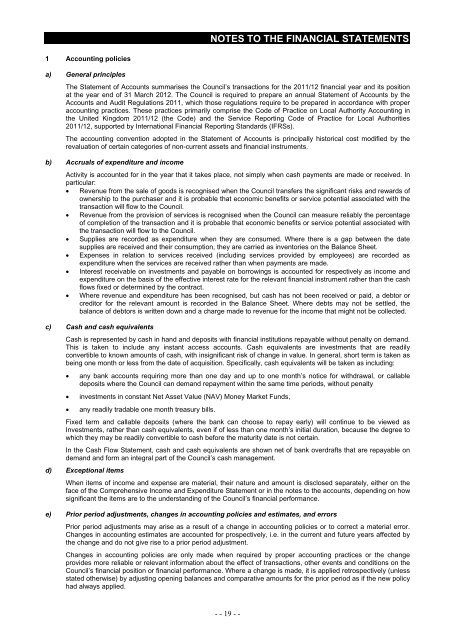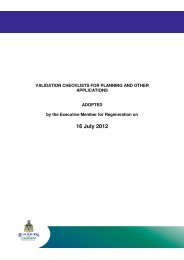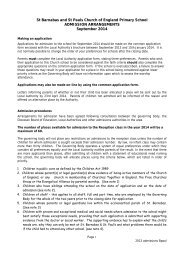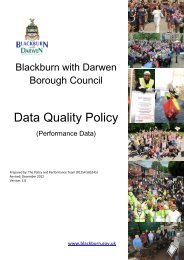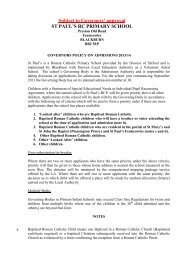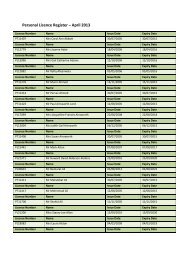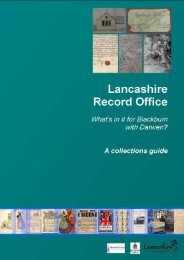Statement of Accounts 2011/2012 - Blackburn with Darwen Borough ...
Statement of Accounts 2011/2012 - Blackburn with Darwen Borough ...
Statement of Accounts 2011/2012 - Blackburn with Darwen Borough ...
You also want an ePaper? Increase the reach of your titles
YUMPU automatically turns print PDFs into web optimized ePapers that Google loves.
NOTES TO THE FINANCIAL STATEMENTS<br />
1 Accounting policies<br />
a) General principles<br />
The <strong>Statement</strong> <strong>of</strong> <strong>Accounts</strong> summarises the Council’s transactions for the <strong>2011</strong>/12 financial year and its position<br />
at the year end <strong>of</strong> 31 March <strong>2012</strong>. The Council is required to prepare an annual <strong>Statement</strong> <strong>of</strong> <strong>Accounts</strong> by the<br />
<strong>Accounts</strong> and Audit Regulations <strong>2011</strong>, which those regulations require to be prepared in accordance <strong>with</strong> proper<br />
accounting practices. These practices primarily comprise the Code <strong>of</strong> Practice on Local Authority Accounting in<br />
the United Kingdom <strong>2011</strong>/12 (the Code) and the Service Reporting Code <strong>of</strong> Practice for Local Authorities<br />
<strong>2011</strong>/12, supported by International Financial Reporting Standards (IFRSs).<br />
The accounting convention adopted in the <strong>Statement</strong> <strong>of</strong> <strong>Accounts</strong> is principally historical cost modified by the<br />
revaluation <strong>of</strong> certain categories <strong>of</strong> non-current assets and financial instruments.<br />
b) Accruals <strong>of</strong> expenditure and income<br />
Activity is accounted for in the year that it takes place, not simply when cash payments are made or received. In<br />
particular:<br />
• Revenue from the sale <strong>of</strong> goods is recognised when the Council transfers the significant risks and rewards <strong>of</strong><br />
ownership to the purchaser and it is probable that economic benefits or service potential associated <strong>with</strong> the<br />
transaction will flow to the Council.<br />
• Revenue from the provision <strong>of</strong> services is recognised when the Council can measure reliably the percentage<br />
<strong>of</strong> completion <strong>of</strong> the transaction and it is probable that economic benefits or service potential associated <strong>with</strong><br />
the transaction will flow to the Council.<br />
• Supplies are recorded as expenditure when they are consumed. Where there is a gap between the date<br />
supplies are received and their consumption, they are carried as inventories on the Balance Sheet.<br />
• Expenses in relation to services received (including services provided by employees) are recorded as<br />
expenditure when the services are received rather than when payments are made.<br />
• Interest receivable on investments and payable on borrowings is accounted for respectively as income and<br />
expenditure on the basis <strong>of</strong> the effective interest rate for the relevant financial instrument rather than the cash<br />
flows fixed or determined by the contract.<br />
• Where revenue and expenditure has been recognised, but cash has not been received or paid, a debtor or<br />
creditor for the relevant amount is recorded in the Balance Sheet. Where debts may not be settled, the<br />
balance <strong>of</strong> debtors is written down and a charge made to revenue for the income that might not be collected.<br />
c) Cash and cash equivalents<br />
Cash is represented by cash in hand and deposits <strong>with</strong> financial institutions repayable <strong>with</strong>out penalty on demand.<br />
This is taken to include any instant access accounts. Cash equivalents are investments that are readily<br />
convertible to known amounts <strong>of</strong> cash, <strong>with</strong> insignificant risk <strong>of</strong> change in value. In general, short term is taken as<br />
being one month or less from the date <strong>of</strong> acquisition. Specifically, cash equivalents will be taken as including:<br />
• any bank accounts requiring more than one day and up to one month’s notice for <strong>with</strong>drawal, or callable<br />
deposits where the Council can demand repayment <strong>with</strong>in the same time periods, <strong>with</strong>out penalty<br />
• investments in constant Net Asset Value (NAV) Money Market Funds,<br />
• any readily tradable one month treasury bills.<br />
Fixed term and callable deposits (where the bank can choose to repay early) will continue to be viewed as<br />
Investments, rather than cash equivalents, even if <strong>of</strong> less than one month’s initial duration, because the degree to<br />
which they may be readily convertible to cash before the maturity date is not certain.<br />
In the Cash Flow <strong>Statement</strong>, cash and cash equivalents are shown net <strong>of</strong> bank overdrafts that are repayable on<br />
demand and form an integral part <strong>of</strong> the Council’s cash management.<br />
d) Exceptional items<br />
When items <strong>of</strong> income and expense are material, their nature and amount is disclosed separately, either on the<br />
face <strong>of</strong> the Comprehensive Income and Expenditure <strong>Statement</strong> or in the notes to the accounts, depending on how<br />
significant the items are to the understanding <strong>of</strong> the Council’s financial performance.<br />
e) Prior period adjustments, changes in accounting policies and estimates, and errors<br />
Prior period adjustments may arise as a result <strong>of</strong> a change in accounting policies or to correct a material error.<br />
Changes in accounting estimates are accounted for prospectively, i.e. in the current and future years affected by<br />
the change and do not give rise to a prior period adjustment.<br />
Changes in accounting policies are only made when required by proper accounting practices or the change<br />
provides more reliable or relevant information about the effect <strong>of</strong> transactions, other events and conditions on the<br />
Council’s financial position or financial performance. Where a change is made, it is applied retrospectively (unless<br />
stated otherwise) by adjusting opening balances and comparative amounts for the prior period as if the new policy<br />
had always applied.<br />
- - 19 - -


